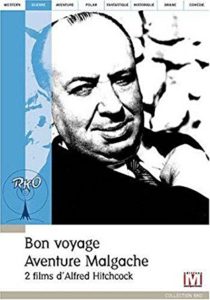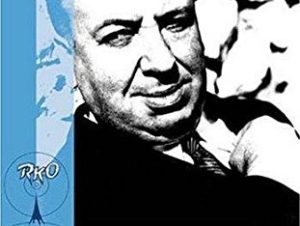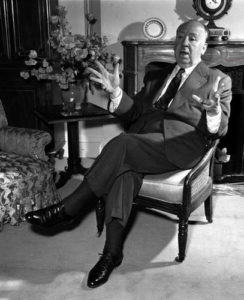Bon Voyage *** (1944, John Blythe, The Molière Players) – Classic Movie Review 7103
Bon Voyage (1944) is the first of two French language half-hour wartime propaganda films made during World War Two made by Alfred Hitchcock for the British Ministry of Information. Hitchcock had been stung into coming back to the UK to give his services to the British government after his former producer Michael Balcon complained about overweight British directors who had left the country for Hollywood ‘while we who are left behind short-handed are trying to harness the films to our great national effort.’
Hitchcock recalled: ‘I knew that if I did nothing, I’d regret it for the rest of my life. It was important to me to do something and also to get right into the atmosphere of war.’
Told in flashback, it is the story of a young Scottish RAF gunner who has escaped from a POW camp in France and is escorted home through Resistance channels by a Polish officer. Back in London, he is questioned by a Free French intelligence officer and realises that his fellow escapee was not what he seemed.
It is told first from the perspective of the RAF gunner, and then through the info of the intelligence officer in London. Hitchcock explained: ‘The RAF man is interrogated by an officer of the Free French Forces, who informs him that his Polish escort was really a Gestapo man. Upon that startling revelation, we go through the journey across France all over again, but this time we show all sorts of details that the young RAF man hadn’t noticed at first, various indications of the Pole’s complicity with the Gestapo detail.’
John Blythe plays RAF Sgt. John Dougall but all the other actors are French, and are credited collectively as The Molière Players, who had escaped from France after the German invasion, to protect their families from the Nazis.
Though the story and its twists are interesting and ambitious for a half-hour short, unfortunately the acting and writing are disappointingly amateurish, and allowances have to be made for the wartime filming and its tiny budget. But the film is fascinating as a historical document and a vital work in the Hitchcock canon, and also compelling for its script’s Rashomon-style idea of using two very different views of the same events.
Hitch said: ‘The Free French Forces supplied me with technical advisers. We worked on the screenplay in my room at Claridge’s, and there was a whole group of French officers who never agreed to anything, so we realised the Free French were very divided.’
Although he was staying at Claridge’s, in London’s Mayfair, one of the best five-star luxury hotels in the world, Hitchcock was paid a token wage of ₤10 a week, but the Ministry of Information also provided him with a complementary hotel room at Claridge’s, where he routinely stayed whenever he returned to London. He recalled: ‘I used to be alone in Claridge’s hotel and the bombs would fall and the guns and I was alone and didn’t know what to do.’
It was shot at Associated British Studios from 20 January 1944 to 25 February 1944.
Bon Voyage is directed by Alfred Hitchcock, runs 25 minutes, is produced by the Ministry of Information, is written by Angus MacPhail and J O C Orton, from a story by Arthur Calder-Marshall, is shot by Günther Krampf, is produced by Alfred Hitchcock, is scored by Benjamin Frankel and is designed by J Charles Gilbert.
The Ministry of Information was disappointed in it as a propaganda film and shelved it, and it was hardly shown in Britain or France at the time.
It is followed by Aventure Malgache (1944), which was also shelved.
The films were shown again in the Nineties after they were restored by the British Film Institute.
It is in French with English sub-titles.
© Derek Winnert 2018 Classic Movie Review 7103
Check out more reviews on http://derekwinnert.com




